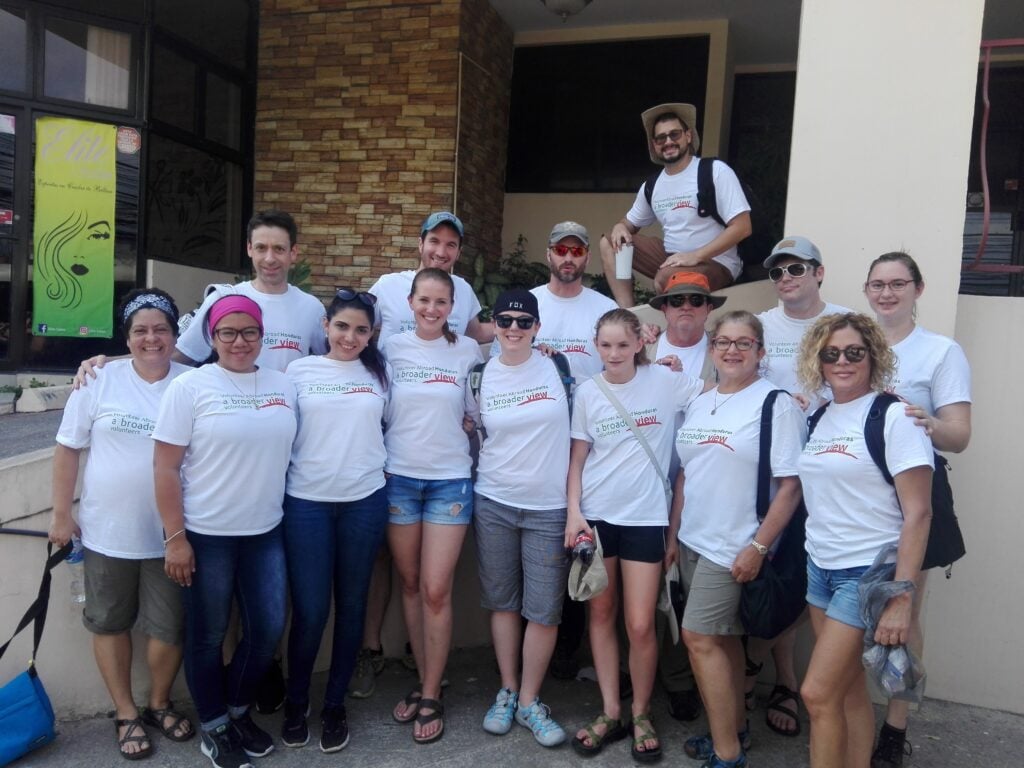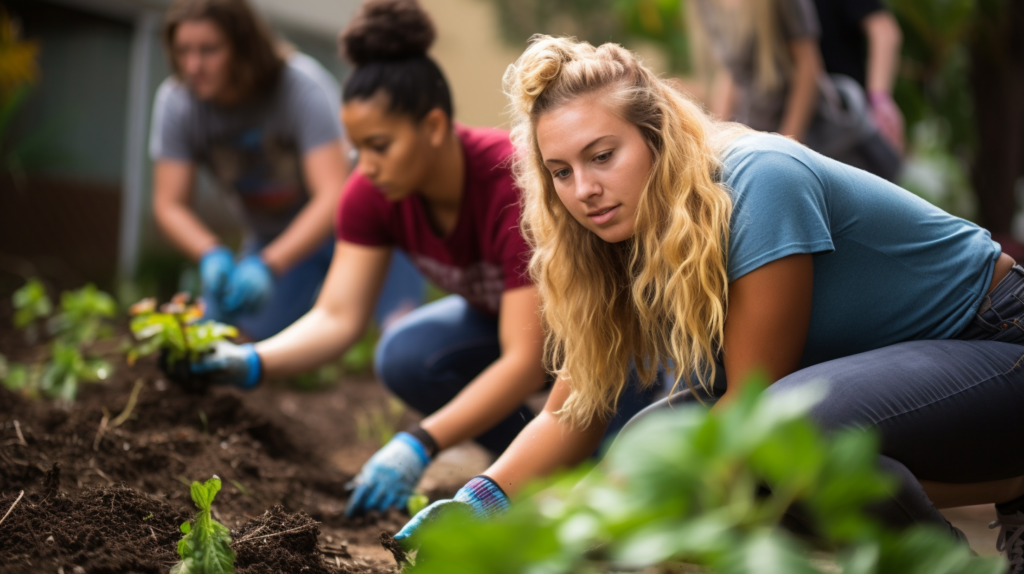Hey there! Are you a college student looking for a unique and rewarding way to spend your free time? Volunteering could be just what you need! Not only does volunteering allow you to give back to your community, but it also provides you with valuable experiences and life skills.
While there are countless volunteering opportunities available, finding the right one can sometimes feel overwhelming. That’s why I’ve compiled a list of 10 unique volunteering opportunities specifically tailored for college students like you. These opportunities will not only make a difference in the lives of others but also help you grow personally and professionally.

So, whether you’re passionate about the environment, love working with animals, or enjoy helping others through tutoring and mentoring, there’s something on this list for everyone. Let’s dive in and explore these exciting volunteering options!
1. Environmental Conservation
Are you a college student looking to make a positive impact on the environment? Volunteering for environmental conservation initiatives is a fantastic way to contribute to the preservation and restoration of our planet. Not only will you be helping the environment, but you’ll also gain hands-on experience, develop valuable skills, and make lifelong friends along the way.
Here are some unique volunteering opportunities in the field of environmental conservation that you can consider:
- Beach Cleanup: Join a beach cleanup initiative to help remove litter and plastic waste from our shores. It’s a great way to protect marine life and keep our beaches clean and beautiful.
- Forest Restoration: Participate in programs that focus on restoring and preserving our forests. You can help plant trees, remove invasive species, and maintain trails for hikers and nature enthusiasts.
- Wildlife Monitoring: Volunteer with organizations that monitor wildlife populations and habitats. You may assist in tracking animals, collecting data, and raising awareness about endangered species.
- Urban Gardening: Get involved in community gardens and urban farming projects. These initiatives promote sustainable living by growing organic food and creating green spaces in cities.
Remember, when choosing an environmental conservation volunteering opportunity, consider your interests, available time commitment, and location. Select an area that aligns with your passion, and you’ll find the experience more rewarding.
Benefits of Volunteering in Environmental Conservation:
- You will develop a deeper understanding of environmental issues and become a more informed global citizen.
- Volunteering in environmental conservation can help you build important skills such as teamwork, communication, and problem-solving.
- It offers a unique opportunity to connect with like-minded individuals, creating lasting friendships and professional networks.
- Volunteering provides a sense of fulfillment and purpose, knowing that you are making a tangible difference in protecting the environment.
So, go ahead and venture into the world of environmental conservation volunteering. By dedicating your time and energy to this cause, you’ll not only contribute to a sustainable future but also gain invaluable experiences that will shape your personal and professional growth.
2. Animal Welfare
Animal welfare is a cause close to the hearts of many individuals, including college students. If you have a passion for animals and want to make a difference in their lives, volunteering in animal welfare organizations can be a great opportunity.
Why Volunteer in Animal Welfare?
- Helping Animals: By volunteering in animal welfare, you can directly contribute to improving the lives of animals. Whether it’s working at an animal shelter, assisting in wildlife rehabilitation, or participating in animal rescue operations, you can make a tangible impact on the well-being of animals.
- Gaining Experience and Skills: Volunteering in animal welfare can provide you with valuable hands-on experience in animal care, handling, and rehabilitation. These skills can be beneficial if you’re considering a career in veterinary medicine, animal behavior, or conservation.
- Making a Difference in Your Community: Animal welfare organizations play an important role in communities by providing essential services like animal adoption, spay/neuter programs, and education on responsible pet ownership. By volunteering, you can contribute to creating a more compassionate and responsible community.

Unique Volunteering Opportunities for Animal Welfare
- Animal Shelters: One of the most common ways to volunteer in animal welfare is by working at an animal shelter. Tasks can include cleaning, feeding, socializing animals, assisting with adoptions, and organizing fundraising events.
- Wildlife Rehabilitation Centers: If you have a passion for wildlife, consider volunteering at a wildlife rehabilitation center. Here, you can help injured or orphaned animals by providing care, assisting in their rehabilitation process, and eventually releasing them back into the wild.
- Animal Rescue Organizations: Animal rescue organizations often deal with emergency situations, such as rescuing animals from neglect, abuse, or natural disasters. Volunteers can help with rescues, transportation, and providing temporary care to these animals until they find permanent homes.
- Conservation Projects: Some animal welfare organizations focus on conservation efforts for endangered species. You can volunteer in projects that involve monitoring wildlife populations, habitat restoration, and public education.
Tips for Volunteering in Animal Welfare
- Research Organizations: Take the time to research and find reputable animal welfare organizations in your area. Look for organizations that align with your values and have proper protocols in place for animal care.
- Attend Orientation Sessions: Many animal welfare organizations require volunteers to attend orientation sessions to understand their mission, policies, and specific procedures. These sessions will also provide you with valuable training on how to handle and care for animals properly.
- Ask Questions: Don’t hesitate to ask questions and seek guidance from experienced volunteers or staff members. They can provide insights on best practices, safety measures, and share their own experiences.
- Be Prepared for Emotionally Challenging Situations: Animal welfare work can be emotionally challenging at times, as you may witness animals in distress or difficult circumstances. It’s important to be mentally prepared and have a support system in place to cope with these challenges.
Volunteering in animal welfare can be a fulfilling experience that allows you to make a positive impact on the lives of animals. Whether you choose to work with domestic animals or contribute to wildlife conservation efforts, your dedication and compassion can make a difference. So, if you’re passionate about animals, consider exploring the various animal welfare volunteering opportunities available to you as a college student.
3. Tutoring and Mentoring
Are you a college student looking for a unique and fulfilling volunteering opportunity? Look no further than tutoring and mentoring! Not only does this type of volunteering allow you to make a positive impact on others’ lives, but it also provides you with valuable skills and experience that can enhance your own personal and professional development. So, let’s dive into the world of tutoring and mentoring and explore why it’s a great volunteering option for college students.
Why Choose Tutoring and Mentoring?
Tutoring and mentoring are rewarding experiences that allow you to share your knowledge and expertise with others. Here are a few reasons why you should consider this volunteering option:
- Make a Difference: By tutoring and mentoring, you have the opportunity to directly impact someone’s educational and personal growth. You can help students improve their academic performance, boost their confidence, and inspire them to reach their full potential.
- Flexible Commitment: Tutoring and mentoring can be done on a part-time or flexible basis, making it an ideal volunteering option for college students with busy schedules. You can choose the number of hours and days that work best for you.
- Develop Transferable Skills: As a tutor or mentor, you develop a range of transferable skills such as communication, patience, problem-solving, and leadership. These skills are highly valued by future employers and can boost your resume.
- Build Connections: Volunteering as a tutor or mentor allows you to build connections with students, educators, and other volunteers. These connections can open doors to future career opportunities and provide a supportive network for personal and professional growth.
Where to Volunteer as a Tutor or Mentor?
Now that you’re convinced that tutoring and mentoring is a great opportunity for college students, let’s explore some options for where you can get involved:
- Local Schools and Education Organizations: Reach out to local schools, after-school programs, and education nonprofits in your area. They often have tutoring and mentoring programs in place and are in need of volunteers.
- Community Centers: Local community centers often offer tutoring and mentoring programs for students of all ages. Check if your community has a center that offers such opportunities.
- Online Platforms: With the rise of remote learning, there are now online platforms that connect tutors and mentors with students virtually. This allows you to volunteer from the comfort of your own home, making it even more convenient for college students.

Tips for a Successful Tutoring and Mentoring Experience
To make the most of your tutoring and mentoring experience, keep these tips in mind:
- Establish Clear Goals: Communicate with the student or mentee to understand their specific needs and goals. Set clear objectives for each session and track progress along the way.
- Be Patient and Understanding: Different students have different learning styles and paces. Be patient and understanding, adapting your teaching or mentoring approach to suit their needs.
- Build Rapport: Take the time to build a positive and supportive relationship with the student or mentee. Show genuine interest in their progress and well-being.
- Utilize Resources: Make use of educational materials, online resources, and teaching aids to enhance the learning experience.
- Seek Feedback and Reflect: Regularly seek feedback from the student, teacher, or mentor coordinator to improve your tutoring or mentoring skills. Reflect on your experiences to enhance future sessions.
Get Started Today!
Tutoring and mentoring provide college students with a wonderful opportunity to give back to their community and make a significant impact on someone’s life. Not only will you be helping others, but you’ll also be gaining valuable skills and building connections along the way. So, go ahead and explore the tutoring and mentoring opportunities available to you. Get started today, and make a difference one session at a time!
4. Community Gardens
Are you a college student looking for a unique and meaningful volunteering opportunity? One exciting option to consider is getting involved in community gardens. Volunteering at a community garden not only allows you to give back to your local community, but it also offers numerous benefits for your physical and mental well-being. So, put on your gardening gloves and let’s dig deeper into the world of community gardens!
What are Community Gardens?
Community gardens are communal spaces where individuals come together to cultivate and maintain plants, vegetables, and herbs. These gardens are typically located in urban areas and provide a valuable green space for the community to enjoy. They offer a range of benefits, including beautifying neighborhoods, promoting sustainable practices, and fostering a sense of community.
Why Volunteer at a Community Garden?
Volunteering at a community garden can be a rewarding experience for college students. Here are some compelling reasons to get involved:
- Educational Opportunities: Community gardens often hold workshops and educational events, providing you with the chance to learn about gardening, sustainable practices, and local ecosystems. You can gain valuable knowledge and skills that can be applied in your personal life or future career.
- Physical Activity: Gardening is a physical activity that allows you to get outdoors, breathe in fresh air, and engage in moderate exercise. It’s a great way to stay active and improve your physical fitness while making a positive impact.
- Mental Well-being: Spending time surrounded by nature has been proven to reduce stress, anxiety, and depression. The calming effect of gardening can help you relax and improve your mental well-being during the challenging college years.
- Community Engagement: Volunteering at a community garden is an excellent way to connect with people in your local area who share similar interests. It provides an opportunity to build relationships, exchange ideas, and create a strong sense of community.
How to Get Involved?
Getting involved in a community garden is easier than you might think. Here are some steps to help you get started:
- Research: Look for community gardens in your area by doing a quick online search or reaching out to local gardening organizations. Find out if they are currently accepting volunteers and what their specific requirements are.
- Attend Orientation: Once you’ve identified a community garden, attend an orientation session or volunteer training. This will help you understand the garden’s rules, expectations, and safety precautions. It’s also an opportunity to meet fellow volunteers and garden coordinators.
- Commitment: Determine how much time you can commit to volunteering. Some community gardens may require a weekly or monthly commitment, while others may be more flexible. Assess your schedule and choose a garden that aligns with your availability.
- Get Your Hands Dirty: Once you’re ready to start volunteering, roll up your sleeves and get involved in various gardening activities. This may include planting seeds, weeding, watering plants, or harvesting produce. Embrace the opportunity to learn from experienced gardeners and contribute to the garden’s maintenance.
Community Gardens: Growing Together
Volunteering at a community garden offers a unique experience for college students to contribute to their local community, learn new skills, and nurture their well-being. By engaging in gardening activities, you can make a meaningful impact while enjoying the benefits of physical activity and connecting with nature. So, why not pick up a trowel and join a community garden near you? Together, we can grow vibrant and sustainable communities.

5. Elderly Care
Taking care of the elderly is a rewarding and meaningful way to give back to the community. There are numerous volunteering opportunities available for college students who want to make a difference in the lives of seniors. Here are some unique and fulfilling ways to get involved in elderly care:
- Assisted Living Facilities: Many assisted living facilities welcome volunteers to spend time with residents. You can engage in activities like reading aloud, playing board games, or simply offering companionship. Building relationships with the elderly can bring joy and comfort to their lives.
- Meal Delivery Services: Organizations like Meals on Wheels provide nutritious meals to homebound seniors. Volunteering as a meal delivery driver allows you to not only deliver food but also check in on the well-being of older adults in your community.
- Memory Care Programs: Memory care programs cater to seniors with cognitive impairments such as Alzheimer’s disease. By participating in these programs, you can help organize stimulating activities like art therapy or music sessions for individuals with memory loss.
- Hospice Care: Volunteering with hospice allows you to provide emotional support and companionship to seniors nearing the end of their lives. You may also offer respite care to provide a break to family caregivers.
- Technology Assistance: Many older adults struggle with using technology, which can be isolating in today’s digital world. By offering your technical skills, you can help seniors navigate smartphones, tablets, or computers, enabling them to stay connected with loved ones.
- Senior Centers: Senior centers often have a variety of volunteering options available. You can assist with organizing events, teaching a class or workshop, or even help with administrative tasks.
- Pet Therapy: Animals have a remarkable ability to bring joy and comfort to individuals. Consider volunteering with a pet therapy program, where you and a trained therapy animal can visit seniors in nursing homes or hospitals.
When volunteering in elderly care, remember to:
- Show empathy and patience towards the elderly.
- Be respectful of their wishes and personal boundaries.
- Listen actively and engage in meaningful conversations.
- Maintain confidentiality and respect privacy.
Volunteering in elderly care not only provides a valuable service to the seniors but also allows you to gain insight into the lives of older adults and develop a sense of compassion and empathy. It is a meaningful way to invest your time and make a positive impact in the lives of others.
6. Homeless Outreach
Homelessness is a pressing issue in many cities around the world, and it’s a problem that often goes unnoticed or ignored by society. However, as a college student, you have the opportunity to make a difference in the lives of those experiencing homelessness through volunteering. Here are some unique homeless outreach opportunities that you can get involved with:
- Soup Kitchens: Soup kitchens provide hot meals to people experiencing homelessness. Volunteering at a soup kitchen can be a rewarding experience as you get to interact with individuals in need and offer them a warm meal. You can serve food, help with clean-up, or even organize fundraising events to support the soup kitchen.
- Street Outreach Programs: Street outreach programs aim to engage with individuals living on the streets and connect them to necessary resources such as food, shelter, and healthcare. As a volunteer, you can join outreach teams and assist in distributing essential items like hygiene kits, blankets, and clothing. You can also lend a listening ear and provide emotional support to those in need.
- Homeless Shelters: Homeless shelters provide temporary housing for those without a place to call home. You can volunteer at a shelter by helping with administration, organizing activities, or providing mentorship and assistance to shelter residents. This is a great opportunity to make a direct impact on someone’s life and help them on their journey towards stability.
- Street Fundraisers: Another way to get involved in homeless outreach is by participating in street fundraisers. These events aim to raise awareness and funds for organizations working towards ending homelessness. You can join a fundraising team and help collect donations, distribute informational materials, or organize creative campaigns to engage the community.
- Mobile Showers and Laundry Services: Lack of access to basic hygiene facilities is a significant challenge for individuals experiencing homelessness. Volunteering with mobile shower and laundry services is an innovative way to address this issue. These programs provide mobile units equipped with showers and laundry facilities that travel to different locations to serve those in need. As a volunteer, you can assist with the operation of these units and help individuals maintain their personal hygiene.
- Advocacy and Policy Work: If you’re passionate about making a lasting impact on homelessness, consider getting involved in advocacy and policy work. This can involve raising awareness about the root causes of homelessness, advocating for affordable housing solutions, and pushing for policy changes that address the issue. You can join organizations that work towards systemic change and use your voice to advocate for those who are often unheard.

By volunteering in homeless outreach programs, you not only provide immediate assistance to those in need, but you also contribute to the larger effort of ending homelessness. It’s a chance to learn about the complex issues surrounding homelessness and develop empathy and understanding towards those affected by it.
Remember, even small actions can make a big difference. So, reach out to local homeless organizations, colleges, or community centers to find opportunities to get involved in homeless outreach. Together, we can work towards creating a more equitable society for all.
7. Children’s Hospitals
Visiting children’s hospitals as a volunteer can be an incredibly rewarding experience. Not only will you be able to provide comfort and support to young patients and their families, but you’ll also gain insight into the world of pediatric healthcare. Here are some unique volunteering opportunities you can explore at children’s hospitals:
Storytelling and Reading Programs
Children’s hospitals often have storytelling and reading programs to help entertain and educate young patients during their hospital stay. As a volunteer, you can contribute to these programs by reading books, sharing stories, and engaging the children in interactive activities. This can help brighten their day and provide a much-needed distraction from their medical treatments.
Arts and Crafts
Organizing arts and crafts activities can bring joy and creativity to the young patients. Many children’s hospitals have designated art rooms where volunteers can lead art sessions, help children explore their artistic talents, and create memorable keepsakes. Painting, drawing, and crafting can provide a therapeutic outlet for children and help them cope with their medical challenges.
Playroom Assistance
Volunteering in the playroom is another opportunity to make a difference in a child’s hospital experience. Playrooms are often equipped with toys, games, and activities that can provide a sense of normalcy during their hospital stay. By spending time with the children in the playroom, you can offer companionship, engage in fun activities, and create a positive and interactive environment.
Special Events and Parties
Children’s hospitals often organize special events and parties to celebrate birthdays, holidays, or milestones. As a volunteer, you can assist in planning and organizing these events. This could involve decorating party rooms, coordinating entertainment, or helping create a festive atmosphere. Participating in these celebrations can bring joy to the children and their families during difficult times.
Comfort and Support
One of the most important roles you can play as a volunteer in a children’s hospital is providing comfort and emotional support to the young patients and their families. This can involve sitting with a child during medical procedures, offering a listening ear, providing reassurance, or simply spending time with them to alleviate their feelings of loneliness or anxiety.
Benefits of Volunteering at Children’s Hospitals
Volunteering at children’s hospitals not only makes a positive impact on the lives of young patients and their families, but it also offers numerous benefits for college students:
- Develop empathy and compassion towards others
- Gain valuable experience in a healthcare setting
- Enhance communication and interpersonal skills
- Learn about pediatric healthcare and medical treatments
- Build connections with healthcare professionals and other volunteers
- Make a difference in the lives of children facing medical challenges
Being a volunteer at a children’s hospital can be an incredibly fulfilling experience. It allows you to support and bring smiles to young patients, while also gaining valuable skills and insights into the medical field. If you have a passion for helping others, consider exploring volunteering opportunities at your local children’s hospital. Your presence and kindness can make a world of difference to a child in need.
8. Youth Leadership Programs
If you’re a college student looking to make a difference and develop your own leadership skills, volunteering in youth leadership programs can be a rewarding opportunity. These programs focus on empowering young people and helping them develop essential life skills while making a positive impact on their lives. Here are some unique youth leadership programs that you can get involved in:
- Youth Mentoring: Many organizations offer mentoring programs where you can work one-on-one with young individuals, providing guidance, support, and helping them navigate challenges. Mentoring allows you to build a meaningful relationship and have a direct impact on a young person’s life.
- Leadership Camps: These camps provide immersive experiences for young people to develop leadership skills through team building activities, workshops, and outdoor adventures. By volunteering at a leadership camp, you can help facilitate activities, mentor campers, and create a positive and inclusive environment.
- Youth Advocacy: If you are passionate about a particular cause or social issue, consider getting involved in youth advocacy programs. These programs involve raising awareness, organizing events, and advocating for positive change in areas such as education, mental health, or environmental sustainability.
- Youth Councils: Many local governments and community organizations have youth councils that allow young people to have a voice in decision-making processes. Volunteering on a youth council gives you the opportunity to collaborate with other young leaders and advocate for the needs of your peers.
- Leadership Training Workshops: Organizations often host leadership training workshops for young people to enhance their leadership skills. As a volunteer, you can assist in facilitating workshops, developing content, and providing guidance and support to participants.
- Internships in Youth Development Organizations: Look for internships in organizations focused on youth development and leadership. These internships provide valuable experience in program coordination, event planning, and mentorship while giving you the chance to work directly with young people.

By volunteering in youth leadership programs, you not only assist in creating positive change but also gain valuable skills and experiences that can benefit you personally and professionally. Here are some key benefits of volunteering in youth leadership programs:
- Develop your own leadership skills: Volunteering in youth leadership programs allows you to practice and enhance your own leadership abilities, such as communication, teamwork, and problem-solving.
- Make a positive impact: By guiding and supporting young people, you can help shape their futures and make a lasting difference in their lives.
- Gain valuable experience: Volunteering in youth leadership programs provides practical experience in working with diverse groups, planning and organizing events, and facilitating workshops.
- Expand your network: You will have the opportunity to connect with other volunteers, professionals, and young leaders who share your passion for youth development.
- Enhance your resume: Volunteering in youth leadership programs shows potential employers your commitment to community involvement, leadership, and the ability to work with diverse populations.
So, if you’re looking for a unique volunteering opportunity while in college, consider getting involved in youth leadership programs. Not only will you make a positive impact on the lives of young individuals, but you will also develop valuable skills and experiences that will benefit you in the long run.
9. Disaster Relief
When a disaster strikes, it can cause widespread destruction and leave communities in desperate need of assistance. Disaster relief organizations play a crucial role in providing immediate aid and support to those affected. Volunteering in disaster relief efforts is not only a way to make a meaningful impact, but it also offers a unique learning experience and an opportunity to develop valuable skills. Here are some ways college students can get involved in disaster relief volunteering:
1. Join a Disaster Relief Organization
There are numerous organizations dedicated to disaster relief efforts, such as the Red Cross and Team Rubicon. These organizations provide training programs and opportunities for volunteers to respond to disasters both domestically and internationally. By joining one of these organizations, college students can be part of a structured and organized response team.
2. Volunteer in Local Disaster Shelters
During times of disaster, many people are forced to evacuate their homes and seek shelter in temporary facilities. Local disaster shelters require volunteers to assist in providing food, shelter, and emotional support to the affected individuals and families. College students can offer their time and lend a helping hand in these shelters.
3. Assist in Disaster Cleanup and Rebuilding
After a disaster, there is often a significant amount of damage that needs to be cleaned up and rebuilt. Volunteer opportunities may include debris removal, repairing homes, and restoring community infrastructure. Participating in these activities not only helps communities recover but also allows college students to learn skills related to construction and rehabilitation.
4. Contribute to Fundraising and Donation Drives
Disaster relief organizations rely on financial contributions and donated supplies to support their efforts. College students can organize fundraising events on campus or assist in donation drives for essential items such as food, water, clothing, and hygiene products. These contributions play a vital role in providing immediate relief to those affected by disasters.
5. Train as a Disaster Response Volunteer
Many disaster relief organizations offer specialized training programs for volunteers interested in becoming certified disaster responders. These training programs cover areas such as disaster preparedness, first aid and CPR, search and rescue techniques, and emergency communication. By receiving this training, college students can be better equipped to respond effectively during a disaster.
6. Utilize Social Media for Disaster Response
In today’s digital age, social media platforms play a significant role in disseminating information during disasters. College students with strong social media skills can volunteer to help update and share relevant information about disaster response efforts, resources, and emergency contact information. This information can be crucial in reaching a wide audience and coordinating relief efforts.
Disaster relief volunteering can be physically and emotionally demanding, but it is an incredibly rewarding experience. It allows college students to help those in need, develop leadership skills, and gain a deeper understanding of the impact of disasters on communities. By actively participating in disaster relief efforts, college students contribute to building more resilient and compassionate societies.
10. International Volunteering
Are you a college student looking for a unique and impactful volunteering opportunity? International volunteering might be just what you’re looking for! By volunteering abroad, you can expand your horizons, contribute to a global cause, and gain valuable life experiences. Here are some reasons why international volunteering is an amazing option for college students:
- Cultural Immersion: Volunteering in a foreign country allows you to immerse yourself in a different culture. You’ll have the opportunity to learn about local traditions, customs, and languages, providing you with a truly enriching experience.
- Global Perspective: International volunteering exposes you to global issues and challenges that communities face around the world. It expands your worldview and helps you understand the interconnectedness of our global society.
- Language Skills: If you’ve always wanted to learn a new language or improve your language skills, international volunteering can provide the perfect environment. By living and working in a foreign country, you’ll have plenty of opportunities to practice and enhance your language abilities.
- Professional Development: Volunteering abroad can boost your resume and make you stand out to potential employers. It demonstrates your adaptability, cultural sensitivity, and willingness to step out of your comfort zone, all of which are highly valuable in today’s globalized job market.
- Personal Growth: Volunteering internationally challenges you to step outside of your comfort zone and confront new situations. It builds resilience, confidence, and problem-solving skills, all of which contribute to personal growth and self-discovery.
- Meaningful Impact: By volunteering abroad, you have the chance to make a real difference in the lives of others. Whether you’re teaching English, building houses, or working on environmental conservation projects, your contributions can have a lasting impact on the communities you serve.
- Networking Opportunities: Volunteering internationally allows you to meet people from all walks of life, including fellow volunteers, locals, and professionals in the field. These connections can be invaluable for future career opportunities or even lifelong friendships.
- Travel and Adventure: Volunteering abroad often comes with opportunities for travel and exploration. During your free time, you can explore nearby cities, natural wonders, or historical sites, making your international volunteering experience even more enriching.
- Intercultural Collaboration: By working alongside local volunteers and communities, you’ll develop your intercultural communication and collaboration skills. This can significantly enhance your ability to work effectively in diverse teams in the future.
- Memorable Experiences: Volunteering internationally is an adventure you will never forget. From the friendships you form to the impact you make, the memories and experiences gained from your time abroad will stay with you for a lifetime.
So, if you’re ready to embark on a life-changing adventure and make a positive impact in the world, consider exploring international volunteering opportunities. It’s a unique way for college students to make a difference, learn about different cultures, and create lasting memories. Take the leap, and see where your international volunteering journey will take you!

Conclusion
Volunteering can be a life-changing experience for college students. Not only does it allow you to make a positive impact on society, but it also provides personal and professional growth opportunities. By volunteering in unique and diverse areas, you can gain new skills, develop empathy and compassion, and build a network of like-minded individuals.
Remember, the volunteering opportunities I mentioned in this article are just a starting point. There are countless other ways you can contribute to your community and the world. The key is to find something that aligns with your interests and values.
So, if you’re a college student looking for a meaningful way to spend your time, consider exploring these unique volunteering opportunities. Whether you choose to work on environmental conservation, help animals in need, or support children’s hospitals, you’ll surely make a difference in the lives of others.
Don’t underestimate the impact you can have as a student volunteer. Every small action counts, and together, we can create a better world for everyone. So go out there, find an opportunity that resonates with you, and make a difference today!
Remember the words of Mahatma Gandhi, “The best way to find yourself is to lose yourself in the service of others.” Happy volunteering!
Frequently Asked Questions
- Why should college students consider volunteering?
College students should consider volunteering because it allows them to gain real-world experience, develop new skills, make a positive impact in their community, build their resume, and expand their network.
- What are some unique volunteering opportunities for college students?
Some unique volunteering opportunities for college students include: 1. Mentoring underprivileged youth, 2. Volunteering at local animal shelters, 3. Assisting in environmental conservation projects, 4. Providing companionship to senior citizens, and 5. Organizing events for non-profit organizations.
- How can college students find volunteering opportunities?
College students can find volunteering opportunities by reaching out to local non-profit organizations, checking college bulletin boards or career centers for postings, using online platforms dedicated to volunteering, or networking with family and friends involved in community service.
- Can volunteering help college students in their future career?
Yes, volunteering can greatly benefit college students in their future career. It allows them to gain practical skills and experiences relevant to their field of interest, build a strong professional network, demonstrate their commitment to community service, and make their resume stand out to potential employers.
- What is the time commitment usually required for volunteering?
The time commitment for volunteering can greatly vary. Some opportunities may require a few hours per week, while others may require more intensive involvement. It’s important for college students to consider their schedule and choose volunteering opportunities that fit their availability and commitments.
-
Safe Solo Volunteering Abroad | Empowerment FemalesThrough Service with ABV

Embrace the adventure of a lifetime with ABV’s supported solo volunteering programs. Create lasting friendships, make a real difference, and explore the world safely under a supportive umbrella. Recommend Peru, Ecuador, Colombia, and more. Table of Contents Introduction to ABV and Solo Volunteering Traveling solo can be a thrilling yet daunting endeavor. A Broad View…
-
Empowerment Through Sustainable programs: Volunteer Opportunities in Peru Cusco

Discover empowering volunteer opportunities in Peru Cusco with www.abroaderview.org. Support sustainable programs and make a positive impact while gaining valuable experiences.
-
Midwives & Obstetricians: Empower Mothers & Babies Abroad

Discover how midwives and obstetricians from abroad can empower mothers and babies through the programs offered by www.abroaderview.org. Make a difference today.



